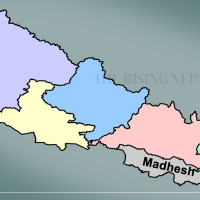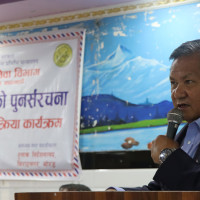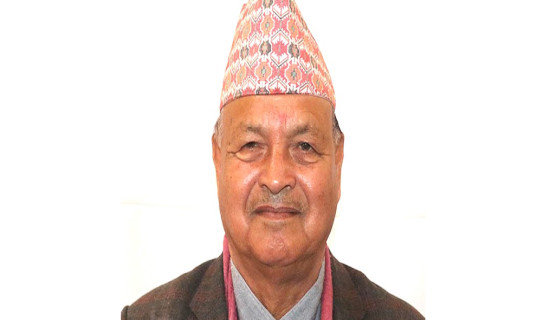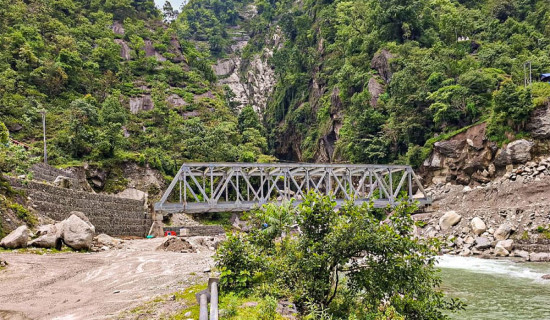- Saturday, 7 June 2025
After high school, students get set for courses of one’s choice
By Erisha Sharma,Kathmandu, June 7: This academic year, approximately 800,000 students took the final examination for grade 12. Normally, completion of grade 12 marks a significant turning point for young students, as their performance in this grade will shape their academic and professional future.
Over the years, students have overcome the narrow options of engineering and medicine, making their own choices. To realise this, many students from across the country have thronged Kathmandu and are preparing for their future academic career. They are attending coaching classes for the subjects of their choice.
Aava Khatri, who appeared the grade 12 exam from KMC in the Science (biology) stream, aims to become a doctor, and to fulfill this dream, she has been taking classes at Vibrant Coaching Institute, New Plaza, Putali Sadak. "Becoming a doctor has been my dream since childhood. I'm working hard every day to make it a reality," she said with determination. Many share Aava’s dream. Every year Medical Education Commission conducts exams for MBBS, BDS, BSc Nursing/Midwifery, BASLP, B Perfusion technology, BAMMS, BMS/BNS, BSc MIT, BPT, BPharm, and BPH courses.
It is one of the most competitive and rigorous entrance exams in the country that opens the door to various medical courses in reputed colleges and universities.
Every year, thousands of students come to Kathmandu to prepare for medical entrance examinations.
They pay around Rs. 30,000 to Rs. 60,000 in an institute to prepare for the entrance exams. The coaching institute stands out for its rich digital resources, flexibility, and experienced faculty. They also offer daily practice tests and comprehensive material. Similarly, there are several online platforms offering courses for aspiring MBBS students with daily MCQs and weekly tests, charging around Rs. 10,000 to Rs. 15,000.
However, institutes like Vibrant and Ambition Guru may still be financially out of reach for many. “This creates a divide among students from different backgrounds, widening the competitive gap. Education should be accessible to all, regardless of financial background," said Biswas Sharma, a school teacher.
This sentiment aligns with the growing trend of budget-friendly courses and online platforms that are helping bridge the gap. This sentiment aligns with the growing trend of budget-friendly courses and online platforms that are helping bridge the gap.
Samir Adhikari came from a small village of Pyuthan with the dream of becoming an IT engineer. “I’ve always been fascinated by technology. My goal is to develop solutions that can improve lives in rural communities like mine,” he says with a hopeful smile.
To pursue a Bachelor of Engineering (BE) degree, students must pass an entrance exam conducted by universities. So, the students join coaching institutes. The PEA Association Pvt. Ltd. is one of Nepal’s most trusted institutes for engineering entrance preparation. The fee ranges from Rs. 18,000 to Rs. 25,000, covering full entrance preparation, materials, and mock tests.
Prabin Karki, a former PEA student, said, "PEA provides structured education and support, but I know many bright students who cannot afford even the basics and it's a serious barrier that needs attention."
On the other hand, Khushi Acharya, a free spirit from Dang dreams beyond boundaries. She hopes to study economics in a foreign university. “I want to explore the world and bring that knowledge back home,” says Khushi with ambition in her eyes.
Many like Khushi seek foreign education for a better career and experience. Some of them apply to their chosen university through a consultancy, while some apply by themselves. The best consultancies offer trusted services like university selection, visa processing, test preparation, and scholarship guidance. However, some students self-apply for foreign universities via a website named Common App. The Common App is an online platform that lets students apply to multiple universities, mainly in the U.S., with a single application. It includes personal info, academic records, activities, and a common essay.
Amrit Gurung from Dhading is more interested in gaining practical skills that can directly lead to a job. “I couldn’t afford to wait for years for a degree that might not guarantee a job. I need skills that can help me earn now,” said Amrit. He has now joined the CTEVT (Council for Technical Education and Vocational Training) programme. CTEVT aims to provide an alternative to traditional academic education by offering practical, job-oriented training in fields like engineering, health, and agriculture. This council was created to support economic development and ensure quality in technical education, and increase access for youth, especially in rural and disadvantaged areas.
Moreover, students are also increasingly choosing career-focused Bachelor programmes like BBA, BCA, BIT, BE, BPH, and BHM over traditional courses like BBS and BA. This shift is attributed to growing job opportunities, demand for practical skills, and global career prospects.
(Sharma is an intern at TRN.)



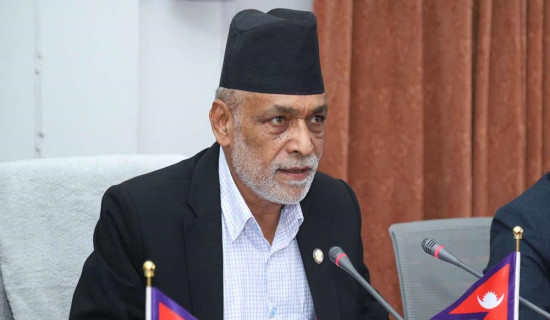
-square-thumb.jpg)
